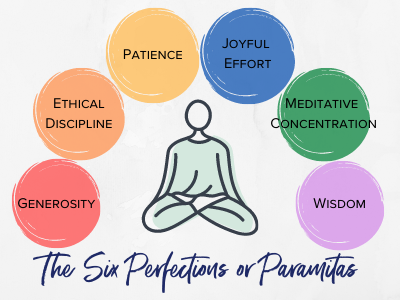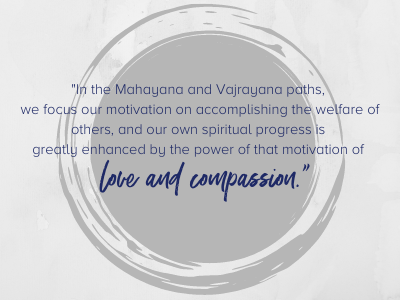The Mahayana Path of Buddhism, where we at Namchak find our roots, focuses upon the Six Perfections also known as the Six Paramitas. Paramita is the Sanskrit word for perfection. Perfection can be an intimidating word, as it’s often linked to an unattainable standard that we hopefully learn to release as we age. In this context, we think of the perfections or paramitas more as guides to enlightenment. No perfection is necessary to get started!
For a little background information, we recommend reading The Three Yanas: Mahayana, Theravada, and Vajrayana Explained to gain a fuller understanding of different paths of Buddhism. Both the Mahayana and Theravada traditions teach the Four Noble Truths. In the approach to the fourth Noble Truth: The Truth of the Path, the Theravada focuses on the Noble Eightfold Path rather than the Six Perfections which we will discuss here.
What makes a Perfection or Paramita Perfect?
The Perfection of Wisdom is the realization of emptiness. This is required in order to realize the remaining perfections, so this is where we begin. The word “realization” makes it sound like something that can happen in a single moment. That is not the case. The realization of emptiness takes time as well as regular practice of Shamata and Vipassana.
Emptiness is a vast topic. In summary, it means that nothing exists on its own without relying upon other things, that all things exist as interdependent phenomena. Learn more about mindfulness of phenomena HERE.
That sounds simple to accept intellectually, but it isn’t the way our minds typically grasp things. We tend to think that objects or people are what they are, in and of themselves. This tendency can be problematic in a world full of reminders of impermanence.
For example, let’s say we assume that one of our friends is always going to be a certain way. Inevitably, they will change. That shift will be difficult for us if we are grasping on to how they once existed.
As beginners in practicing the path of the Six Perfections, we make acts of generosity. But our generosity is not yet “the Perfection of Generosity” because we still believe in the true existence of ourselves as the giver, the action of giving, and the person to whom we are giving.
Another important factor in all these practices is that they must serve as antidotes to the afflictive mental and emotional states that are contrary to them. For example, our practice of generosity should counter our attachments and desires, patience should counter our anger, meditative concentration should counter our distraction, and so on. Click HERE to read more about afflictive mental and emotional states and how to work with them.
Now that we know what makes the perfections the perfections, let’s discuss the essence of each.

What are the Six Perfections or Paramitas?
1. The Perfection of Generosity
Generosity begins with the altruistic intention of benefiting others. It sounds like giving things, right? That is true, but in the Mahayana Path of the Perfections, generosity is the mental state of giving up something to which we are attached without expectation of reciprocity or recognition.
It’s easy to give away things that we don’t want, right? The act of giving isn’t the primary emphasis, the mind is. We are developing the “mind of giving” which serves as the antidote to our attachments.
2. The Perfection of Ethical Discipline
Similarly, Ethical Discipline doesn’t mean merely to restrain ourselves from negative thoughts and actions. It means to abandon them in our minds, meaning that we shouldn’t stubbornly resist the temptation to do bad things, but should stop wanting to do them in the first place.
This teaching focuses on ancient Buddhist teachings on moral virtue and learning how to cultivate a life of kindness, compassion, and wisdom. By cultivating Ethical Discipline, you can discover the power of refraining from harmful actions, gathering virtue, and helping others and gain a deeper understanding of how Ethical Discipline can help purify your mind.
Here we can see the transformational aspect emphasized in Mahayana. Of course, this shift doesn’t happen overnight. That comes with dedicated practice and experiencing the benefits of meditation.
For example, a person can take on a strict diet and force themselves to follow it everyday without enjoyment, or they can learn and experience the benefits of eating foods that nourish their body and make them feel good. Then they will want to make better (for them) food choices.
Traditionally it’s said that merits accrued over one-thousand years can be destroyed by a single moment of anger. Anger often calls us to act quickly and with force. However, the outcome is not usually what we wanted in the first place. We’ve probably all seen this play out in our lives: we act quickly out of anger only to regret our harmful behavior.
Patience or forbearance is to have an undisturbed mind. This means that when you meet with persons or situations that you would rather avoid or bring anger to you, you can remain calm. This doesn’t mean suppressing or stubbornly holding in these feelings but remaining unattached to the anger or upset.
Imagine if we could meet with challenging persons or situations with a calm and undisturbed mind. What would that look like and how could that benefit our relationships? It is one thing to logically know that anger is a temporary emotion. When we practice the Perfection of Patience, we can experience anger as a passing emotion rather than grasping it and causing harm.
This doesn’t mean that you never experience anger. Instead, you are aware of its arrival and can quickly release it, rather than grasping on to it as a solidly existing thing. Again, the mind is the most important factor, not the action.
4. The Perfection of Joyful Effort
Joyful Effort or diligence means to feel enthusiastic about these wholesome pursuits. There’s a difference between being stubbornly persistent about things and being genuinely joyful and enthusiastic about doing them. Our goal is the latter. This serves as the main antidote to laziness, which means to lack that enthusiasm towards these wholesome aspects of our spiritual growth.
A lack of joyful effort can come from feeling incapable, not understanding the benefits of such pursuits, or from being addicted to worldly activities like being on our phones, watching TV, obsessing with socializing, and so on. None of those are inherently bad, but they can become problematic when accompanied by an obsessive attitude.
Have you ever set a goal to meditate more but then found yourself strictly following your practice goals without enjoyment? Or maybe you gave up on meditation entirely because you found no joy in the process? Most of us experience these types of situations throughout our meditation journeys.
When we arrive at this impasse, and most of us will, it may be helpful to contemplate how meditation has positively impacted our lives. Seeing the benefits on the cushion and in our daily lives can serve as an antidote to laziness and help us find enthusiasm for our meditation practice. That enthusiasm is an aspect of the Perfection of Diligence or Joyful Effort.
Joyful effort empowers all the other perfections.
We like to think of it as the wind in our sails. Keep in mind that winds are always changing. This is natural and normal. Similarly, amidst life’s ups and downs, we will experience periods where our motivation for meditation is difficult to find. In these times, it may be helpful to make a list of the benefits of meditation and your intentions for practicing.
If we feel capable, enthusiastic, joyful, and genuinely interested in our spiritual development, we will progress naturally and quickly without needing to strictly discipline ourselves to make time for it. If we feel like we are lacking the Joyful element, we can spend time contemplating the benefits of meditation.
Another way to boost that joyful effort is to be a part of a meditation community. That way when you’re motivation wanes, you can hear about another person’s motivations for practicing and perhaps share in their joyful effort. Learn more about practicing with others and joining a Learning Circle HERE.
5. The Perfection of Meditative Concentration
Meditative concentration means for one’s mind to rest specifically upon a virtuous object, which is the stable foundation for developing the Perfection of Wisdom. “Virtuous object” here means an object that doesn’t give rise to non-virtuous thoughts and emotions.
Click HERE for more information about Buddhist virtues and non-virtues.
In The Way of the Bodhisattva, Shantideva says, ““Profound insight joined with calm abiding utterly eradicates afflictive states. Knowing this, first, seek out calm abiding.”
This refers to Shamata or Calm Abiding, a practice we use to train our power of attention. We focus on an object again and again, attempting to sustain single-pointed focus for as long as possible. Begin or rejuvenate your Shamata practice with our free eCourse HERE.
With an unstable and distracted mind, even if we gain an intellectual understanding of the ultimate truth, that understanding will not develop into a direct experience that can liberate us. Therefore, we must first train our minds in Calm Abiding to develop the Meditative Concentration that will empower our profound insight into the nature of reality.
Wisdom, or sublime intelligence as it is sometimes translated, means to know things precisely as they are. In other words, to know reality as it really is. In the context of the Six Perfections, the Perfection of Wisdom means the realization of emptiness—the ultimate nature of all things. It is this wisdom that makes the other five become “perfections.”
The first five are the methods that will lead us to the wisdom that realizes emptiness, which is one of the primary causes of enlightenment.

So, even though we primarily focus on bringing others to enlightenment, it is the power of that intention itself that brings about our own enlightenment.
If you want to learn more about the Six Perfections, check out these Dharma talks, checkout our Six Perfections YouTube playlist. These are Dharma talks about each perfections from our 2023 One Community Sangha gatherings. Start listening HERE.
Join us at an upcoming event! We have weekend retreats, short teachings, and community meditation sessions. See all of our events HERE.
Further reading:
What the Buddha Taught by Walpola Rahula
The Nectar of Manjushri’s Speech by Kunzang Pelden
Ornament of Precious Liberation by Gampopa
Reset & Renew
We invite you to join us for a precious opportunity to learn and immerse in foundational meditation practices in the presence of a supportive community and the beauty of the Namchak Retreat Ranch.
Over this in-person weekend retreat, you’ll learn foundational Buddhist meditation practices while enjoying the support and warmth of a like-minded community. Whether new to meditation or looking to refresh your practice, this retreat offers tools to cultivate mindfulness, compassion, and resilience in your daily life. The retreat will be in-person at the Namchak Retreat Ranch: Bodhi House, in Hot Springs, Montana from Friday, April 11 – Sunday, April 13, 2025

